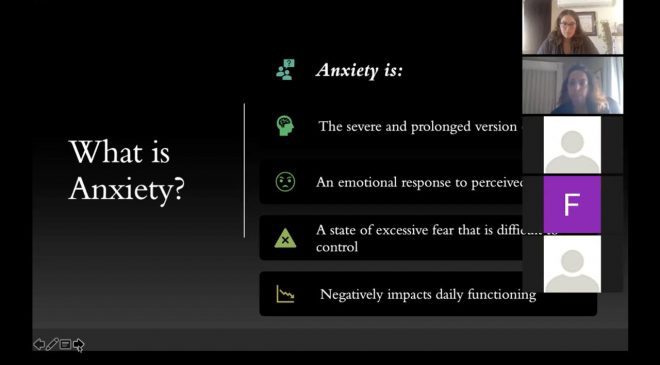Mastering Anxiety: Tips to Calm your Body and Mind
By: Doha Wang
@DohaWang
Photo Courtesy of AUC-Connect
Anxiety can manifest itself into people’s lives and affect their bodies, thoughts, emotions and behavior, but for freshmen struggling with the pressures of university life, being able to properly identify it can immensely help to control it.
Nour Al-Zouhairy, intern in the Masters of Art in counseling psychology at AUC, explained that anxiety can be present as excessive fear or prolonged stress. Sometimes a little bit of stress can be healthy to keep a person going, but once it becomes a hindrance to everyday life functions, it becomes unhealthy.
“Anxiety can affect physical health. It can cause pain and it can impair the functioning of the immune system,” said Al-Zouhairy in last week’s Webinar titled Un-steaming The Anxiety Pot.
Since this year’s freshmen have been immersed into a completely new and unfamiliar mode of instruction and environment, Amal Badeeb, senior counselor at the Center for Student Well-Being, explained that it has caused them feelings of distress.

Most students, especially international ones, have found it difficult to form relationships with one another through online classes.
“They don’t have the social networks in the city or in AUC, and it takes time for freshmen students to make friends,” Badeeb told The Caravan.
She added that social and personal relationships are vital to students’ lives in order for them to have a support system. However, it is also important to note that forming relationships takes time, and that students should give themselves a chance to settle in.
“Initiate the first move and interact with classmates,” Badeeb said.
When asked what the freshmen’s biggest struggle this semester is, Badeeb said that it was their inability to manage their time between academics and co-curricular activities. She explained that this struggle continues with them until their graduation.
Badeeb suggests that students prioritise academics for the first two-semesters and not more because they also need the experience of socializing.
“But when you do engage in activities, don’t take on the responsibilities by yourself. Learn to do things in a team and believe in the power of group effort,” Badeeb said.
In terms of academic pressure, she suggested that students should avoid associating their bed with stressful matters like attending online classes or using it as a place to study. Instead, she advised to associate it with managing anxiety by simply calling up a friend to vent, or taking time off to play a game.
In the meantime, Al-Zouhairy cautioned against the need to over-plan and overthink tasks to feel somewhat in control. This causes an ongoing cycle of trying to achieve a task so flawlessly that it causes deep focus on the minutiae, which then creates anxiety that leads to trying to perfect the task.
“Accept that perfectionism is not applicable at all times, and be flexible with your expectations of yourselves,” commented Badeeb.
And that also means ensuring there is adequate time for rest.
Lameese El-Desouky, assistant professor of psychology, explained that anxiety can cause poor concentration and sleep disturbance. Having a proper amount of sleep allows the body to rest, to repair itself and promote growth. Sleep is an essential key in regulating one’s emotions, which directly correlates to their social relationships and other personal factors.
“Sleep is essential for paying attention when learning new information, storing that information into memory and effectively recalling that information,” El-Desouky told The Caravan.
But one of the most noticeable effects of stress is binge eating or not eating at all. Al-Zouhairy says this can cause a very unbalanced diet which deteriorates the mental and physical well being of a person, and can eventually lead to poorer performance.
Amr Taher, a nutritionist and co-founder of Brass Monkeys, a fitness studio, believes that a person’s environment is the biggest factor in causing anxiety, whether that be instability, toxic relationships, an unhealthy diet or lack of physical activities.
Taher advises that proper consumption of food containing vitamin B like whole grains, meat, nuts, fruits and vegetables can improve a person’s mood and overall health.
Drinking lots of water is also a must, as well as avoiding fatty foods, junk food, processed sugars and carbs as they are extremely unhealthy and burden the body.
He said that a great way to tremendously reduce stress is by lowering the amount of caffeine consumed on a daily basis. Excess caffeine intake can lead to faster breathing and increase in heart rate. It also elevates cholesterol levels which if prolonged, may eventually result in chronic stress.
Exercise is also key and Taher recommends practicing any form such as cycling, dancing, and yoga for 30-minutes a day to release endorphins – hormones that relieve stress, pain and produce feelings of happiness.
“Surround yourself with others who can motivate you to practice a healthy lifestyle and not drive you away from it,” said Taher.



